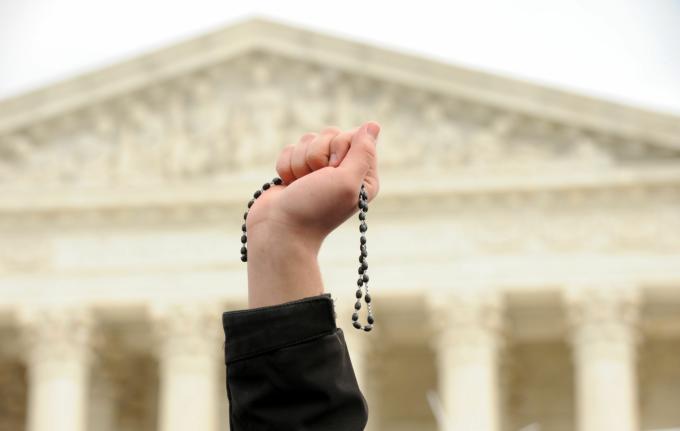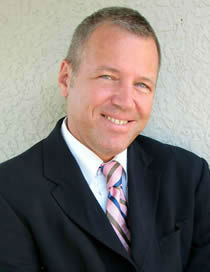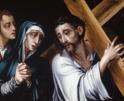
Spirituality

Pakaluk
(The following are edited remarks by Michael Pakaluk to the Massachusetts Caucus at the March for Life, Jan. 27, 2017. -- Ed.)
My first car was an AMC Matador made in 1973. Perhaps because Matador means "killer," and Roe was decided in 1973, I couldn't help associating the two and used to joke that I would drive that car until Roe was reversed.
Given that the car was a near antique when I got it, and AMCs were hardly known for quality, it was a very optimistic resolution. But that's how people in the pro-life movement used to think. The country, we thought, would quickly throw off this decision so at odds with its great aspirations.
Many years later things appear not so simple. Nonetheless we are perhaps closer than ever to a reversal.
Here three things need to be considered: public sentiment; legislative action; and the consciences of Supreme Court justices.
Lincoln once said: "With public sentiment, nothing can fail; without it, nothing can succeed. Consequently, he who molds public sentiment goes deeper than he who enacts statutes or pronounces decisions. He makes statutes and decisions possible or impossible to be executed."
Despite the capture of the mainstream media by the abortion rights view, and the universities and learned professions as well, public sentiment has been moving slowly in the pro-life direction. Social media will favor that trend: people share happy things rather than failures. There are probably 3,000 shared ultrasound photos from expectant moms for every 1 woman trying to put a positive spin on her abortion.
The Trump victory shows that public sentiment is currently unstable, and "tilting point" phenomena are possible. The continued advance of an aggressive ideology of personal autonomy no longer seems inevitable. It seems possible that public opinion will coalesce into a general pro-life outlook.
And yet, we must candidly acknowledge that a culture of life is not possible without a rejection of the sexual revolution. The main consideration which undergirds Roe today is not ideology but the sense that it can't really be the case that a one-night hookup can commit someone to 20-plus years of childbearing and child raising. We trivialize life because we first trivialized sex.
What about legislative action? The last big Supreme Court abortion decision was 5-3 defending the abortion industry. Thus two appointments are necessary, not one. This raises a question of timing. Should state legislatures and Congress bring forward cases which might threaten Roe before that potential majority is secured?
Some legislation can actually help in confirmation battles in the Senate. Hadley Arkes has argued that the Infant Born Alive act, passed under George H.W. Bush but gutted under Clinton, should be restored now, not least to provide a debating point: "Does that Senator really believe that a baby born alive during an abortion should not be protected?"
But arguably legislatures should continue to pass laws which would require the Supreme Court to apply the "undue burden" test established by the 1992 Casey decision, as a way of showing up the arbitrariness of that test.
This brings me to the third consideration -- the consciences of the Justices. It's a fundamental instinct of a judge to wish to be, and to appear to be, independent. Judges will be disturbed in conscience if their independence seems compromised.
Both the Rawlsian concept of political society, and the theory of originalism, are embraced by judges because they provide a way of understanding their work as independent. Independence is more basic than the philosophies which divide the Court.
We can interpret the Casey decision as the Court trying to find a position which would preserve its independence. Hence, the contortions explaining why "stare decisis" had to be invoked; the bizarre language about "jurisprudence of doubt" and "testing the nation by following;" the majority's desperate attempts to say it was salvaging Roe; and the suggestion that the Court should refuse to overturn Roe precisely because there were huge protests against it.
That is why Justice Thomas's dissent in Whole Women's Health, the most recent abortion decision, proves to be crucial.
Scalia in Casey had in effect said, "In Roe we removed the rule of law. There has been nothing constant in our abortion jurisprudence since then. The undue burden standard, which we've just fashioned, is incoherent, and cannot re-establish the rule of law."
Thomas returns to this claim and says that it's been proved true. But more importantly he goes back to Scalia's 1989 paper, "The Rule of Law as a Law of Rules." There, Scalia argues that there is a rule of law only when a court succeeds in extracting a general rule from a case. Otherwise one has the rule of men, not the rule of law.
Thomas in his dissent surveys the Supreme Court jurisprudence since Roe. Importantly, he goes deeper than abortion jurisprudence and criticizes the whole scheme of "levels of scrutiny." He says, in effect, "the Court has not succeeded in establishing the rule of law here."
Members of the pro-life movement will think: "Ah, so the Court has become an undemocratic oligarchy! A judge will look at the same argument and think: Ah, so we have lost our independence! We are being someone's henchmen. We are doing someone else's work for them."
That truth has been perfectly documented by Thomas and Scalia. Hence, the third thing necessary for Roe v Wade to be overturned is for Supreme Court Justices in conscience to recognize this truth and in conscience see that they can restore their independence only by reversing Roe.
- Michael Pakaluk is Professor of Ethics and Social Philosophy in the Busch School of Business at The Catholic University of America. His book on the gospel of Mark, ‘‘The Memoirs of St. Peter,’’ is available from Regnery Gateway.
Recent articles in the Spirituality section
-
He saw the cloths and believedBishop Robert Barron
-
God's instrument for viewing the crucifixionMichael Pakaluk
-
QuinquagesimaMichael Pakaluk
-
Pro-life Christians: Now is the time to shout from the rooftopsBishop Robert Barron
-
Seeking an indulgence as an act of faithMichael Pakaluk


















